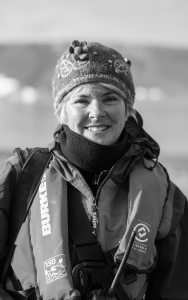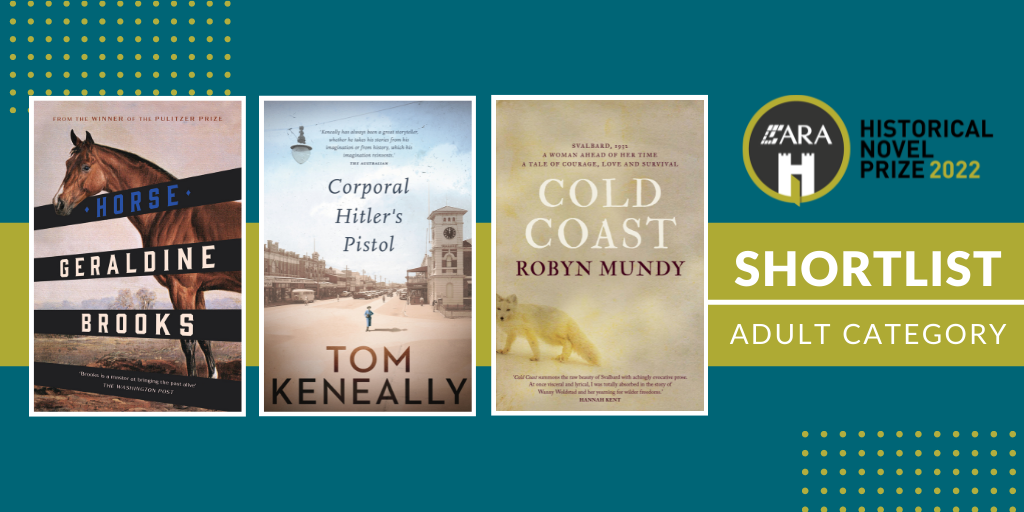
In conjunction with its generous sponsor ARA Group, the Historical Novel Society Australasia (HNSA) has announced the three talented authors, and their outstanding novels, selected in the Shortlist for the 2022 ARA Historical Novel Prize – Adult Category. The shortlisted entries include:
- Horse by Geraldine Brooks (Hachette Australia)
- Corporal Hitler’s Pistol by Tom Keneally (Penguin Random House)
- Cold Coast by Robyn Mundy (Ultimo Press)
The Winners of the ARA Historical Novel Prize will be announced on Thursday 20 October 2021.
THE JUDGING PANEL
The 2022 judging panel for the Adult category included Angelo Loukakis (Chair), Madison Shakepeare and Meg Keneally.
Due to actual or perceived conflicts of interest in relation to authors longlisted in the Prize, Meg Keneally withdrew from judging the shortlist and winner. This is in accordance with the HNSA’s Conflicts of Interest policy.
According to Angelo Loukakis, “The Judges’ shortlisted titles for 2022 well-illustrate that the finest historical novels are not mere retellings of things past, dead and buried, but works that speak of ‘what was once’ in ways that also provide attentive readers with creative insights of relevance to contemporary concerns.”
“The titles we have chosen travel a very wide world indeed. They include a novel which presents an unusually situated and very much proto-feminist account of independence and self-making in 1930s Norway, one that powerfully relates the profound impacts of 20th Century wars on the people of a small Australian coastal town and beyond, and another that provides an uncommon picture of 19th Century American racism with a 21st Century aftermath through the story of a great racehorse.”
“Each of these works is a carefully constructed, imaginatively rendered expression of their author’s unique vision. In their fictional explorations of historical events, and of patterns in culture and society across time, here are three impressive novels that also encourage us to think of life to come and how it might be better lived.”
HORSE BY GERALDINE BROOKS
(Hachette Australia)
ABOUT GERALDINE BROOKS

She is also the author of the acclaimed non-fiction works Nine Parts of Desire and Foreign Correspondence. In 2011 she presented Australia’s prestigious Boyer Lectures, later published as The Idea of Home. In 2016 she was appointed Officer in the Order of Australia for her services to literature. Geraldine Brooks divides her time between Sydney and Massachusetts and has two sons. For further information, visit Geraldine’s website.
ABOUT HORSE
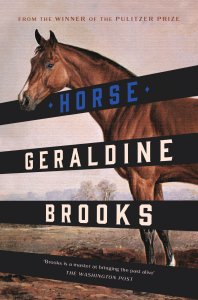
Washington, DC, 2019. Jess, a Smithsonian scientist from Australia, and Theo, a Nigerian-American art historian, find themselves unexpectedly connected through their shared interest in the horse – one studying the stallion’s bones for clues to his power and endurance, the other uncovering the lost history of the unsung Black horsemen who were critical to his racing success.
Horse is the latest masterpiece from a writer with a prodigious talent for bringing the past to life.
A Quote from Geraldine Brooks
I am honored and thrilled to be shortlisted for the ARA Historical Novel Prize. This generous award recognises the value of historical fiction, where an imaginative engagement with our shared past can do so much to increase empathy and understanding.
A Quote from the Judging Panel
“Horse is a novel as much about America and its history as it is about the racetrack and one of its most famous racehorses. Among much else in this excellent novel, Geraldine Brooks portrays the workings of horse breeding and racing in 19th Century America – workings that, like much else in the larger economy, required its share of enslaved labour – and tells of that country’s pre-Civil War era social structure and inequities, as well as their more contemporary manifestations.”
“This is a creatively conceived, absorbing novel from an author clearly dedicated to telling an uncommon story. It delivers a sobering picture of old as well as modern race relations in a country still stressed by the worst of its unresolved past, while also presenting the reader with a gripping account of a truly special animal and the lives of the human beings who loved and cared for it. A fine contribution to quality historical fiction.”
CORPORAL HITLER’S PISTOL BY TOM KENEALLY
(Penguin Random House)
ABOUT TOM KENEALLY

ABOUT CORPORAL HITLER’S PISTOL
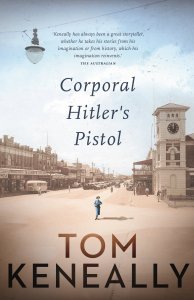
A hero of the First World War has a fit at the cinema and is taken to a psychiatric ward in Sydney, his Irish farmhand is murdered, and a gay piano-playing veteran, quietly a friend to many in town, is implicated.
Corporal Hitler’s Pistol speaks to the never-ending war that began with ‘the war to end all wars’. Rural communities have always been a melting pot and many are happy to accept a diverse bunch … as long as they don’t overstep. Set in a town he knows very well, in this novel Tom Keneally tells a compelling story of the interactions and relationships between black and white Australians in early twentieth-century Australia.
A Quote from Tom Keneally
“I am honoured to be part of the shortlist for the ARA Historical Novel Prize. All awards are welcome since they make further writing possible and mean your book has visibility. When you’re shortlisted for a prize, it confirms that other people agree with the idea that you are, in fact, a writer.”
A Quote from the Judging Panel
“Corporal Hitler’s Pistol is a richly imagined and vivid novel that moves the reader skilfully from WW1 to the Irish Civil War, from rural Kempsey to Sydney and County Kerry during the first half and more of the 20th Century. It is a novel that shows the impacts of the larger history of the world on individual lives and local histories, that tells of brutal wars and their wounds – whether felt on the skin or beneath – as brought home.”
“As much as for the words and doings and inner lives of its characters, Corporal Hitler’s Pistol is also notable for its distinctive ‘voice’ – the confident, authorial voice that is recognisably Keneally’s own. His is a multifarious narrative voice that finds room for wit, pathos, anger, forgiveness, that reports as confidently as it beguiles, in the end giving the reader words not only to believe in but difficult to resist.”
COLD COAST BY ROBYN MUNDY
(Ultimo Press)
ABOUT ROBYN MUNDY
For over 20 years Robyn Mundy has worked seasonally as a ship-based tour guide in Svalbard, Greenland, Antarctica, the Norwegian coast and wild Scotland. Her numerous visits to Svalbard led to her 2021 novel Cold Coast. She is the author of Wildlight and The Nature of Ice, novels inspired by her love of wild places. At home in Tasmania, Robyn writes, and works as a local trek guide. For further information, visit:
ABOUT COLD COAST
In 1932, Wanny Woldstad, a young widow, travels to Svalbard, daring to enter the Norwegian trappers’ fiercely guarded male domain. She must prove to Anders Sæterdal, her trapping partner who makes no secret of his disdain, that a woman is fit for the task.
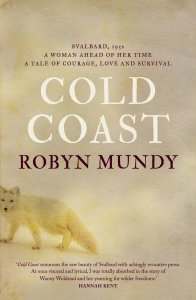
A Quote from Robyn Mundy
“The prospect of giving life on the page to a 1930s era, of being equipped to offer readers the experience of real people from a country and culture other than my own, still seems terrifying to me. But beyond this trepidation was a determination to share the raw, extraordinary human experience of Svalbard’s first female trapper, alongside that of a small blue Arctic fox trying to survive its first Arctic winter. To have Cold Coast short-listed alongside the work of Geraldine Brooks and Tom Keneally is a treasured moment of recognition. The spectacular ARA Historical Novel Prize is made possible by the value and vision afforded to the Arts by Edward Federman and the ARA group, along with the dedication of the HNSA and its judges. Thank you, all, for this tremendous offering.”
A Quote from the Judging Panel
“Set in 1930s Svalbard, a northern Norwegian archipelago of islands, Cold Coast re-animates the real-life story of Wanny Woldstad and Anders Saeterdal, focusing on Woldstad’s commitment to learn from Saeterdal the work of the animal trapper in that era. While holding a mirror to earlier attitudes and the cruel trade these supported, the novel is also notable for its compelling characters, especially its female protagonist Woldstad.”
“Robyn Mundy’s prose here is extraordinarily alive, whether in detailing a threatening, icy environment, the behaviour of various animal species, or its the human characters’ lives and thoughts. A work of outstanding historical fiction, Cold Coast relates the life of a woman who, ‘proto-feminist’ in outlook, is in search of a life of independence beyond the constraints and sorrows she has known. Captured through an inordinately sharp lens and excellent literary technique, Cold Coast is very much a fiction for today.”
ABOUT ARA GROUP

The ARA Endowment Fund currently donates 100 per cent of the interest earned annually to The Go Foundation, The Indigenous Literacy Foundation and The David Lynch Foundation.
ARA Group has also sponsored the Historical Novel Society Australasia’s biennial conferences since 2017, is Principal Partner of Sydney Writers Festival, the Monkey Baa Theatre, the National Institute of Dramatic Art, and Presidential Partner of Taronga Zoo.

